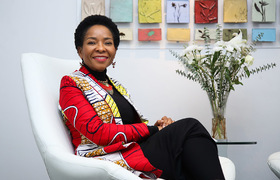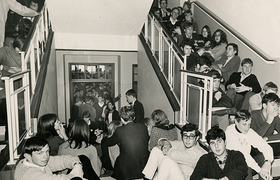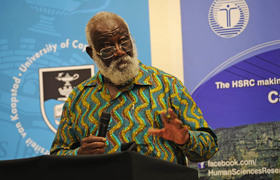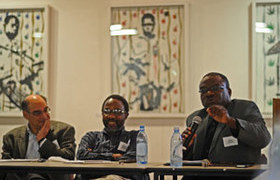Archie Mafeje’s legacy honoured
10 August 2018 | Story Kim Cloete. Photos Robyn Walker. Read time 7 min.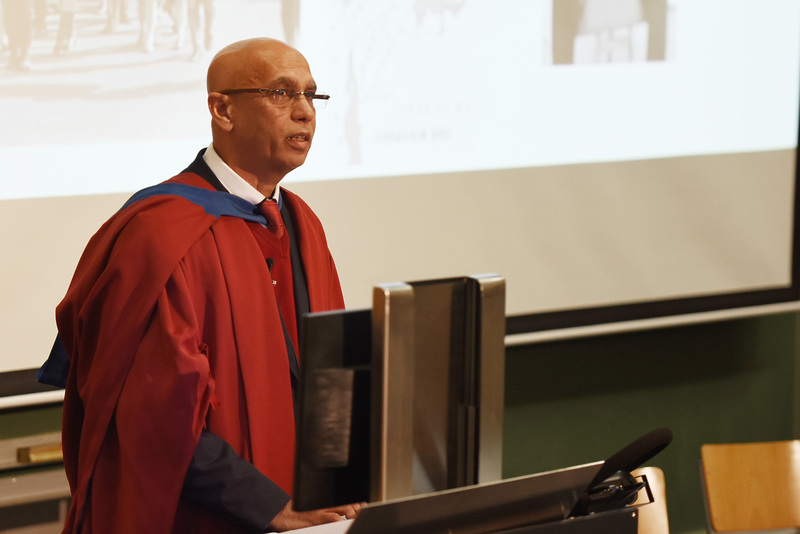
The profound contribution and legacy of Archie Mafeje – known as one of Africa’s greatest social scientists – formed the core of the Vice-Chancellor’s Inaugural Lecture presented by Professor Shahid Vawda.
“Monwabisi Archibald Mafeje is well known as a struggle icon, but more importantly he was also a provocateur who continues to challenge us today,” Vawda said in his lecture, titled “The Provocation of Archie Mafeje”, on Wednesday, 8 August.
Vawda, a respected scholar, holds the Archie Mafeje Chair in Critical Humanities and Decolonial Studies, as well as the directorship of the School of African and Gender Studies, Anthropology and Linguistics in UCT’s Faculty of Humanities.
In his lecture, which coincided with the 50th anniversary of the Archie Mafeje Affair at UCT, he described Mafeje as a man ahead of his time and a revolutionary thinker whose commitment to open, progressive scholarship challenged ready-made solutions and conventional ideas.
“Neither central committees nor academic comrades shackled his independence. He debated with the best minds of his and the younger generation of African scholars.”
Fifty years ago, the UCT Council unanimously approved the appointment of Mafeje as senior lecturer in social anthropology. But following significant pressure from the apartheid government, the Council rescinded its offer a month later. The move led to widespread protest action, with 600 students staging a nine-day occupation of UCT’s Bremner building.
Mafeje was never allowed to take up a post at his alma mater. Now, through the Archie Mafeje Chair, Vawda is intent on driving new research and knowledge which will build on his legacy.
“We cannot allow his profound contribution to dissolve into myth or echoes of what might have been.”
“There is the familiar persona of Mafeje – the struggle icon, revolutionary intellectual, and the victim of racial prejudice and discrimination. It is imperative, however, that we do not allow this historical character to obscure the multidimensional Mafeje – the scholar of this land, and this university. We cannot allow his profound contribution to dissolve into myth or echoes of what might have been.”
New research agenda
Vawda said he intends to sketch a research agenda, relying on certain key ideas in Mafeje’s work, which were both provocative and intriguing and would “leave the door open for us to walk through and to embark on further investigation”.
Mafeje was committed to freedom from colonial rule, to emancipation, progress and to justice.
While he did not know Mafeje personally, said Vawda, he got to know him through being a student of his work. Mafeje’s book Langa “shattered the notions that African people lived ‘tradition’-embodied lives”.
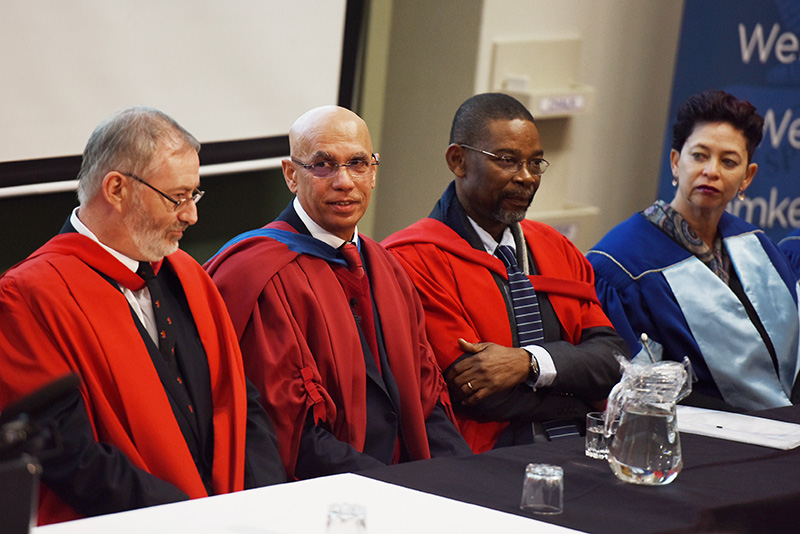
Langa, which is subtitled A study of social groups in an African township, did not depict “rural as backward and urban as modern”, but rather looked at new forms of solidarity and of modernity, opening new avenues for research, he explained.
Mafeje’s work in the 1960s was also among the first to challenge Eurocentricism, which assumes Europe’s development was the prime mover of world history.
Vawda also referred to Mafeje’s major work The Theory and Ethnography of African Social Formations, which is based on the politics surrounding the Great Lakes of Africa before European colonialism. He said Mafeje’s work does not investigate one single kingdom or so-called tribe, as was usual with anthropologists at the time, but rather looks at an entire region.
Mafeje’s research asked some key questions.
“Can there be African modernity that precedes colonial modernity is a suggestive question that arises out of Mafeje’s work. Posing the question in this way asks of us, as researchers, to look with a lens from the inside out, rather than looking into Africa. It recentres Africa, and in particular southern Africa, as part of other and larger regional social formations.”
“Can there be African modernity that precedes colonial modernity is a suggestive question that arises out of Mafeje’s work.”
Vawda has also embarked on a research study which looks into the importance of Africa, and the southern Indian Ocean region in particular. He said evidence of urban settlements along the coast of eastern / southern Africa between 500 CE and the 12th century suggest trade, markets and migration as central activities.
“That is to say markets and exchange were an institutionalised social phenomenon, or to use Mafeje’s language, part of regional social formations.
“Indeed, the evidence of trade between the Great Zimbabwe / Mapungubwe complex, stretching further inland to other urban settlements with routes to the eastern African coast, suggest that the connection between southern Africa and the rest of the world through trade routes across land and the Indian Ocean with Asia and the Christian and Islamic worlds is much more concrete and significant than imagined within previous paradigms derived from European thought.”
Ahead of his time
The research Vawda envisages builds on the insights that Mafeje offers. He believes the full significance of Mafeje’s many actions, writings and lectures is yet to be grasped.
“Now is the time to attend to the incomplete and unfinished intellectual tasks he set, and re-imagine his thoughts with our thoughts, hopefully change the remnants of colonial frames of reference, and make the necessary paradigm shifts Mafeje called for so loudly.”
“Now is the time to attend to the incomplete and unfinished intellectual tasks he set.”
Vice-Chancellor Professor Mamokgethi Phakeng said she was delighted that Vawda had joined UCT last year.
“His inaugural lecture also gives us an opportunity as a university to say how delighted we are that the professor has chosen our university to work in. We are very pleased to have his calibre in our midst.”
The inaugural lecture dovetailed with a colloquium on campus which focused on Mafeje’s primary contribution to the study of Africa, his intellectual and political activism, and his quest for social justice. It was held to mark the 50 years since the sit-in at Bremner building in 1968.
 This work is licensed under a Creative Commons Attribution-NoDerivatives 4.0 International License.
This work is licensed under a Creative Commons Attribution-NoDerivatives 4.0 International License.
Please view the republishing articles page for more information.







